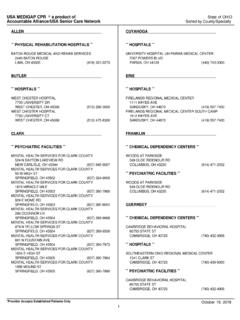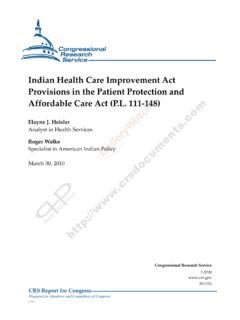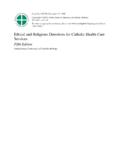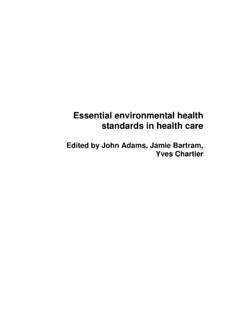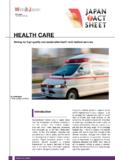Transcription of Health Care Terminology Glossary ---A--- - USAMCO
1 Health care Terminology Glossary ---A--- AAHCC - American Accreditation Health care Commission - AAHCC accreditation is an important quality "seal of approval" for provider networks and managed care organizations. Gaining accreditation requires meeting standards for confidentiality, staff qualifications and credentials, program qualifications, quality improvement programs, accessibility and on-site review procedures, information requirements, utilization review procedures and appeals. Academic Medical Center (AMC) A partnership uniting a medical school, a hospital, and physician groups for the purpose of educating and training medical students, as well as conducting research. Access A patient's ability to obtain medical care determined by factors such as the availability of medical services, their acceptability to the patient, the location of Health care facilities, transportation, hours of operation, and cost of care .
2 Accident and Sickness Coverage for short term income replacement when the covered person is disabled because of an accident or illness. Same as weekly indemnity, weekly disability, and short term disability. Accidental Death and Dismemberment Insurance providing a benefit if the insured person dies by accidental means or accidentally loses certain specified body parts (leg, arm, etc.). Accountable Health Plan (AHP) Under the Managed Competition Act, providers and insurance companies would be encouraged (through tax incentives) to form AHPs, similar to HMOs, PPOs, and other group practices. AHPs would compete on the basis of offering high-quality, low-cost care and would offer insurance and Health care as a single product.
3 They would be responsible for looking after the total Health of members and reporting medical outcomes in accordance with federal guidelines. Accreditation The granting of approval given by a credible organization, of the processes, policies and procedures utilized by the entity seeking such approval. Various organizations in the healthcare industry grant accreditation's, such as the Joint Commission on Accreditation of Healthcare Organizations (JCAHO). Activities of Daily Living (ADL(s)) An individual's daily habits such as bathing, dressing and eating. ADLs are often used as an assessment tool to determine an individual's ability to function at home, or in a less restricted environment of care .
4 Actual Use Effectiveness The effectiveness of a product in real-life situations. Actual use effectiveness considers compliance rates, physical condition of the patient, and the side effects associated with the product's use. Actuary A person in the insurance field who decides insurance policy rates and reserves dividends as well as conducts various other statistical studies. Acute care A pattern of Health care in which a patient is treated for an acute (immediate and severe) episode of illness; for the subsequent treatment of injuries related to an accident or other trauma; or during recovery from surgery. Acute care is usually delivered in a hospital setting by specialized personnel using complex and sophisticated technical equipment and materials.
5 Unlike chronic care , acute care is usually only delivered over a short time span of 30 days or less. Acute care Services Coordinated services related to the examination, diagnosis, care , treatment, and disposition of acute episodes of illnesses. Acute Disease Disease characterized by a single episode of fairly short duration, usually less than 30 days, and from which the patient can be expected to return to his or her normal or previous state and level of activity. Additional Diagnosis Any diagnosis, other than the principal diagnosis, that describes a condition for which a patient receives treatment or which the physician considers of sufficient significance to warrant inclusion for investigative medical studies.
6 Additional Drug Benefit List Also called a drug maintenance list, the additional drug benefit list is a catalogue of pharmaceuticals approved by a managed Health care plan for dispensing when drugs are prescribed other than those listed under the benefit package. Adjudicate The act of applying the provisions of a benefit plan to a claim. Administrative Services Organization (ASO) An arrangement under which an insurance company, for a fee, processes claims and handles paperwork for a self-funded group. This frequently includes all insurance company services (actuarial services, underwriting, benefit description, etc.) except assumption of risk. Admission The act of placing an individual under treatment or observation in a medical center or hospital.
7 The day of admission is the day on which the medical center or hospital makes a formal acceptance (assignment of a register number) of the patient who is to be provided with room, board, and continuous nursing service in an area of the hospital where patients normally stay at least overnight. While the admission of a newborn is deemed to occur at the time of birth, live births are reported separately and excluded from admission data. Admission data include direct admissions, direct admissions from the emergency room and transfer-in patients from other medical treatment facilities; but exclude absent-sick patients, carded-for-the-record only (CRO) cases, and transient patients. Admission Certification A method of assuring that only those patients who need hospital care are admitted.
8 Certification can be granted before admission (preadmission) or shortly after (concurrent). Length-of-stay for the patient's diagnosed problem is usually assigned upon admission under the certification program. Advanced Practice Nurse (APN) An umbrella term that describes a registered nurse (RN) who has met advanced educational and clinical practice requirements beyond the two to four years of basic nursing education required of all RNs. Aftercare Services that are administered after hospitalization or rehabilitation that are individualized . Allied Health Personnel Trained and licensed Health workers other than physicians, dentists, optometrists, chiropractors, podiatrists, and nurses. The term is sometimes used synonymously with paramedical personnel, all Health workers who perform tasks that must otherwise be performed by a physician, or Health workers who do not usually engage in independent practice.
9 Allowable Charge The maximum fee that a third party will reimburse a provider for a given service. Allowable Costs Items or elements of an institution's costs that are reimbursable under a payment formula. Allowable costs may exclude, for example, uncovered services, luxury accommodations, costs that are not reasonable, and expenditures that are unnecessary. Alternative Birthing Center - A facility offering a "non-traditional" ("not like a hospital") setting for giving birth. These may range from a free-standing center to a special area within a hospital and are known for having a more comfortable, home-like atmosphere. More participation is allowed for the father and more procedural flexibility is allowed than in standard hospitals.
10 Alternate care Medical care received in lieu of inpatient hospitalization. Examples include outpatient surgery, home Health care , and skilled nursing facility care . It also may refer to nontraditional care delivered by providers such as midwives. Alternate Delivery Systems Health services provided in other than an inpatient, acute- care hospital or private practice. Examples within general Health services include skilled and intermediary nursing facilities, hospice programs, and home Health care . Alternate delivery systems are designed to provide needed services in a more cost- effective manner. Most of the services provided by community mental Health centers fall into this category. Ambulatory care Health services delivered on an outpatient basis.




